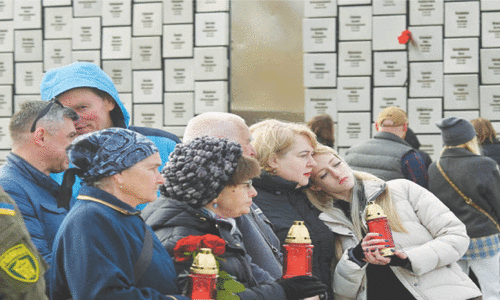
It was not bad luck, however, that doomed Pakistan. Michener’s grim assessment of Pakistan rested not on the country’s condemnation by chance or fortune, but by a crucial failure in its core idea. The severing of East and West Pakistan represented to Michener the end of the tantalizing dream of the religious state, proof of the inadequacy of religion as the foundation of a nation state. Faith had been the only basis of uniting East and West Pakistan, the glue with which the vast chasm of cultural differences, geographical incongruencies, qualms, and quibbles over politics and outlook and ethnicity were to be molded together into one statuesque edifice of nationhood. This glue of a common faith had been infused in the once-united country’s constitution, but it could not glue the two halves of the country together.
Decades after Michener’s essay, religion dangles again over the gaping wounds of a bleeding nation. Since 1971 and the excision of a portion of the country, it has been used to paper over the perfidy of dictators, to keep the country’s women forever suspect, to imagine an authenticity that reality has failed to hand up. If religion is believed to be the glue, the country has needed a lot of it to keep its armies fighting, to keep its people paranoid, to make it all work. There is popular religion on television talk shows, to be ingested with recipes for chicken chow mein; there is the religion of beards and exposed ankles, the religion of school textbooks, the religion of cricket matches, and of course the religion of suicide bombers.
Once again, it has not been enough. Lathered liberally over a nation that imagines itself forever soiled, it has failed to purify, failed to unite, and failed to enlighten. All it has done is change the contestation over culture, over misunderstood identity, over limited opportunity into a sordid contest of the accessories of piety. Unable to unite, it remains still the object of an insatiable hunger, slathered on open wounds it cannot heal. The anger of the bleeding distorts it, devolves and daily denigrates it. Before a bleeding blinded population, its arbiters are not men of learning or men of spiritual substance but men with the blood of thousands on their hands, men of war. Theirs is a vision not of the future but of a crudely imagined past — dark, primitive, poor, and paranoid. Today’s lament for Pakistan is that this landscape of dread has become the vision of a nation.
But if the loss of one part of itself did not provoke the grim deliberations that would reveal the delinquencies of nationhood, the ravages of the current moment are also unlikely to do so. The burden of 60 and some years of believing in one idea, on erecting nationhood on faith, means that imagining alternatives feels at once traitorous and misguided. If not this, what then, asks a generation that knows only war, that has not been trained to look elsewhere, that imagines goodness as blind obedience and spirituality as a political act.
There are no answers for them; the greed of those who have gobbled up faith has rendered dissent into blasphemy and silence into survival. Soiled by the politics of power and death, religion stands misused and politics confused. Amid the wreckage of old ideas, of peace talks, amid ready shrouds and promises for the future by the robbers of the past, is the fear that the shuddering, shivering edifice of our nationhood will crumble and fall as it nearly did once before, occasioning from one writer, now long dead, a lament for Pakistan. His words from the past touch our present; our quest for a nation built on faith has left behind a faith without feeling, and a nation without meaning.
Rafia Zakaria is an attorney and human rights activist. She is a columnist for DAWN Pakistan and a regular contributor for Al Jazeera America, Dissent, Guernica and many other publications.
She is the author of The Upstairs Wife: An Intimate History of Pakistan (Beacon Press 2015). She tweets @rafiazakaria











































